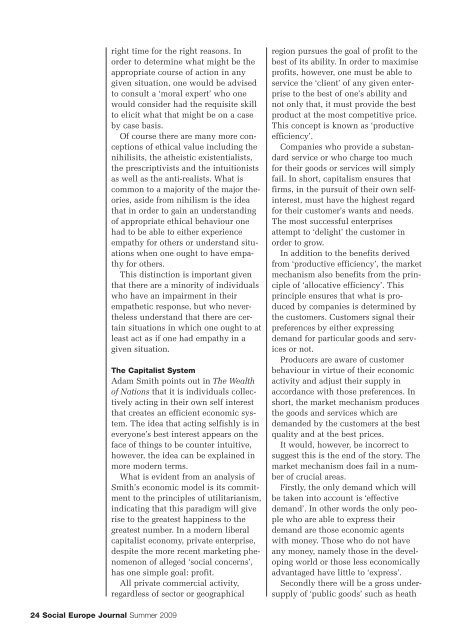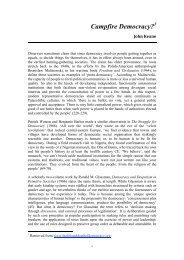The Ethics of Capitalism - Social Europe Journal
The Ethics of Capitalism - Social Europe Journal
The Ethics of Capitalism - Social Europe Journal
Create successful ePaper yourself
Turn your PDF publications into a flip-book with our unique Google optimized e-Paper software.
ight time for the right reasons. In<br />
order to determine what might be the<br />
appropriate course <strong>of</strong> action in any<br />
given situation, one would be advised<br />
to consult a ‘moral expert’ who one<br />
would consider had the requisite skill<br />
to elicit what that might be on a case<br />
by case basis.<br />
Of course there are many more conceptions<br />
<strong>of</strong> ethical value including the<br />
nihilisits, the atheistic existentialists,<br />
the prescriptivists and the intuitionists<br />
as well as the anti-realists. What is<br />
common to a majority <strong>of</strong> the major theories,<br />
aside from nihilism is the idea<br />
that in order to gain an understanding<br />
<strong>of</strong> appropriate ethical behaviour one<br />
had to be able to either experience<br />
empathy for others or understand situations<br />
when one ought to have empathy<br />
for others.<br />
This distinction is important given<br />
that there are a minority <strong>of</strong> individuals<br />
who have an impairment in their<br />
empathetic response, but who nevertheless<br />
understand that there are certain<br />
situations in which one ought to at<br />
least act as if one had empathy in a<br />
given situation.<br />
<strong>The</strong> Capitalist System<br />
Adam Smith points out in <strong>The</strong> Wealth<br />
<strong>of</strong> Nations that it is individuals collectively<br />
acting in their own self interest<br />
that creates an efficient economic system.<br />
<strong>The</strong> idea that acting selfishly is in<br />
everyone’s best interest appears on the<br />
face <strong>of</strong> things to be counter intuitive,<br />
however, the idea can be explained in<br />
more modern terms.<br />
What is evident from an analysis <strong>of</strong><br />
Smith’s economic model is its commitment<br />
to the principles <strong>of</strong> utilitarianism,<br />
indicating that this paradigm will give<br />
rise to the greatest happiness to the<br />
greatest number. In a modern liberal<br />
capitalist economy, private enterprise,<br />
despite the more recent marketing phenomenon<br />
<strong>of</strong> alleged ‘social concerns’,<br />
has one simple goal: pr<strong>of</strong>it.<br />
All private commercial activity,<br />
regardless <strong>of</strong> sector or geographical<br />
region pursues the goal <strong>of</strong> pr<strong>of</strong>it to the<br />
best <strong>of</strong> its ability. In order to maximise<br />
pr<strong>of</strong>its, however, one must be able to<br />
service the ‘client’ <strong>of</strong> any given enterprise<br />
to the best <strong>of</strong> one’s ability and<br />
not only that, it must provide the best<br />
product at the most competitive price.<br />
This concept is known as ‘productive<br />
efficiency’.<br />
Companies who provide a substandard<br />
service or who charge too much<br />
for their goods or services will simply<br />
fail. In short, capitalism ensures that<br />
firms, in the pursuit <strong>of</strong> their own selfinterest,<br />
must have the highest regard<br />
for their customer’s wants and needs.<br />
<strong>The</strong> most successful enterprises<br />
attempt to ‘delight’ the customer in<br />
order to grow.<br />
In addition to the benefits derived<br />
from ‘productive efficiency’, the market<br />
mechanism also benefits from the principle<br />
<strong>of</strong> ‘allocative efficiency’. This<br />
principle ensures that what is produced<br />
by companies is determined by<br />
the customers. Customers signal their<br />
preferences by either expressing<br />
demand for particular goods and services<br />
or not.<br />
Producers are aware <strong>of</strong> customer<br />
behaviour in virtue <strong>of</strong> their economic<br />
activity and adjust their supply in<br />
accordance with those preferences. In<br />
short, the market mechanism produces<br />
the goods and services which are<br />
demanded by the customers at the best<br />
quality and at the best prices.<br />
It would, however, be incorrect to<br />
suggest this is the end <strong>of</strong> the story. <strong>The</strong><br />
market mechanism does fail in a number<br />
<strong>of</strong> crucial areas.<br />
Firstly, the only demand which will<br />
be taken into account is ‘effective<br />
demand’. In other words the only people<br />
who are able to express their<br />
demand are those economic agents<br />
with money. Those who do not have<br />
any money, namely those in the developing<br />
world or those less economically<br />
advantaged have little to ‘express’.<br />
Secondly there will be a gross undersupply<br />
<strong>of</strong> ‘public goods’ such as heath<br />
24 <strong>Social</strong> <strong>Europe</strong> <strong>Journal</strong> Summer 2009







